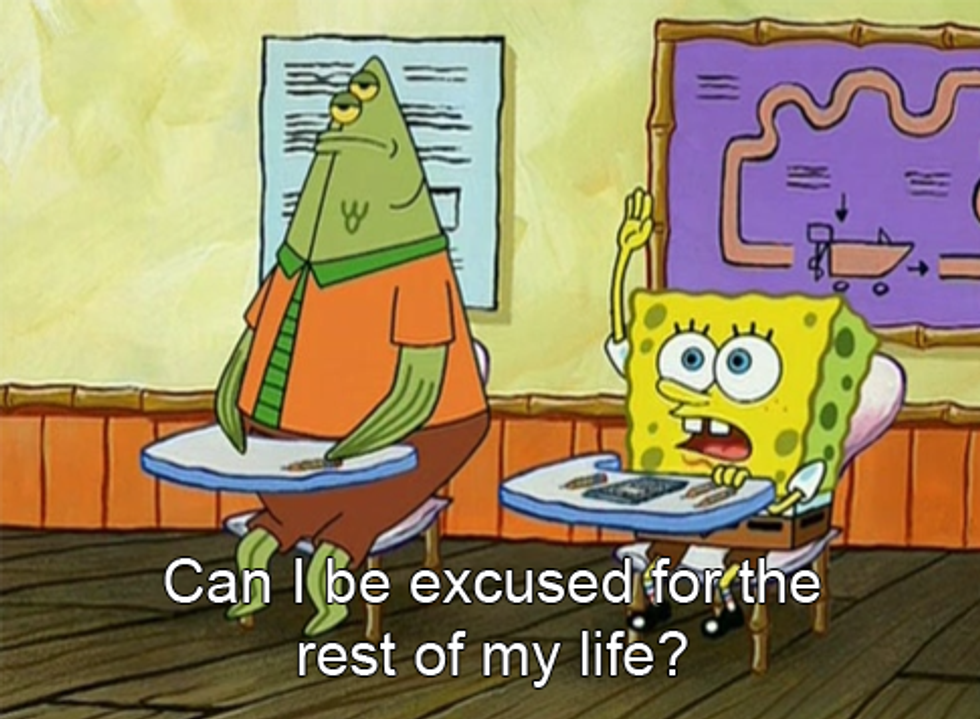The vast majority of the time, I would say I feel safe where I am- in class, at work, or out and about. I'm not often skeptical of the safety of both myself and those around me. In a perfect world, nobody would have to be. As a young woman, there have been times in which I've felt unprepared to stay safe without relying on help from a man. Unsurprisingly and unfortunately, men are taken more seriously as authority figures in compromising situations, and women aren't regularly taught how to defend themselves independently.
My first summer home from college, I worked at a discount movie theatre in Snellville, Georgia. I left this job much more promptly than I would've expected. After all, I'd spent the first two weeks of summer applying anywhere I could think of and hoping that just one would be willing to take a bicoastal college student. I was grateful to have the job despite the disorganized management, the dinginess of the theatre itself, and the rude customers. I thought of it all as being a part of the part-time summer job package. When the job started, I didn't pay much mind to the instruction to only take out the trash during daytime hours, or to always act like I was talking to a man on the walkie talkies. However, one night, a few teenage boys managed to sneak to the upstairs offices and escape from the side doors of the building without setting off the alarm. What we knew for certain was that they were up to no good, and the supervisor on duty explained that ill-intentioned guests were more likely to act when they saw the theatre was exclusively staffed by women. I had also heard from other employees about aggressive customers or about trespassers trying to sleep in the theaters after hours. Because I was predominantly scheduled for late night shifts, I felt that I wasn't truly safe working there.
Though conundrums like these were not uncommon, the only defense plan anyone had was to call the male manager or, in many instances, to simply pretend there was a man around.
Last semester, I worked the ticket table for a show I was helping to produce for a student organization. Ironically, it was a feminist comedy show, and a popular one at that. So popular, in fact, that the tiny theatre filled to capacity early on. After the show had already started, a few young men showed up to see a friend of theirs in the show. We (being female-identifying members of this organization) informed them that the seats were full and that the show had already started. They would have to come back the next day. They proceeded to yell at us about having driven in two-hour traffic, that they couldn't come the next day, and that we basically needed to let them in or else. We continued to amp up our firmness and bluntness as their comments grew more aggressive and out of line. It wasn't until the male house manager told them the same information we did that they gave up the fight and left. Unlike at my movie theater job, we exercised a more assertive approach to the situation. Nevertheless, it took the intervention of a man to be taken seriously.
When I compare these two stories (and more), I realize that nobody really trains you to defend yourself as a woman in charge. To some degree, women are loosely taught to defend themselves using a double standard: don't be too passive and risk coming off as an easy target, but don't assert dominance and risk provoking someone. When we walk down an unsafe street, are we better off looking slightly down or looking people right in the eye? Although I employ assertiveness in most settings and leadership roles, I feel relatively stuck when a man presumes he has power over me- as if there's no imminent way to win in the situation. I have the power, intelligence, and free-will to stand up to people, but I feel like they can practically smell my fear. What will I do if placed in a scenario with much higher stakes?
At the end of the day, I really don't know how to solve this issue for myself or others. We all have different leadership styles, strengths, and coping mechanisms. What I'm certain of if that this issue requires much more discussion in the workplace, in schools, and anywhere that a woman in charge might face a safety threat.
- 5 Better Ways To Protect Women And Girls Than Opposing Trans ... ›
- Being A Woman In 2019 Is Scary, And I'm Not Okay With That ›
- Are Women Responsible For Their Own Safety? ›
- Women aren't lesser and safety is first ›
- What Is Modern Sexism And Are You Guilty? ›
- Security and Safety Guide for Women ›
- What would a city that is safe for women look like? | Cities | The ... ›
- 34 Things Women Do To Stay Safe Show The Burden Of 'Being ... ›
- Women in Safety Excellence ›
- Women's Safety | Department of the Prime Minister and Cabinet ›
- 16 actions for girls' and women's safety in emergencies - UNICEF ... ›
- Promoting safety for women | Sustainable Living | Unilever global ... ›
- 5 Things Women Are Judged More Harshly For Than Men | HuffPost ›




















